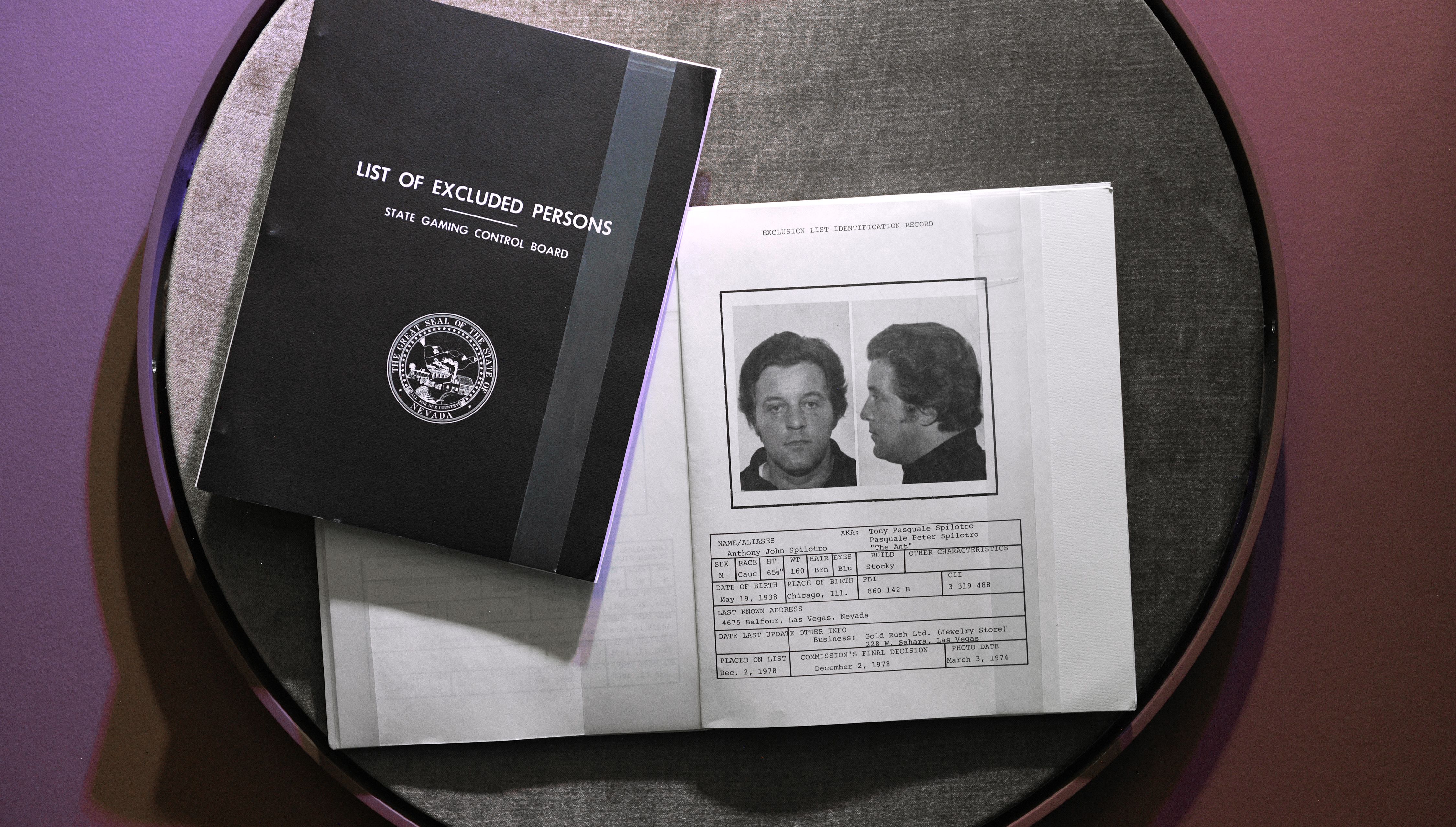They are considered the worst of the worst.
In its early years, this notorious list was dominated by gangsters who had ties to organized crime. Some of the most infamous mob figures in casino lore — Carl and Nicholas Civella, Joseph Sica and Sam Giancana — were among the first to be listed in Nevada gaming regulators’ Book of Excluded Persons, or the “Black Book.”
It’s been nearly 65 years since the the state issued its first Black Book — the roster of individuals who aren’t allowed to enter the state’s largest casinos because of their criminal past.
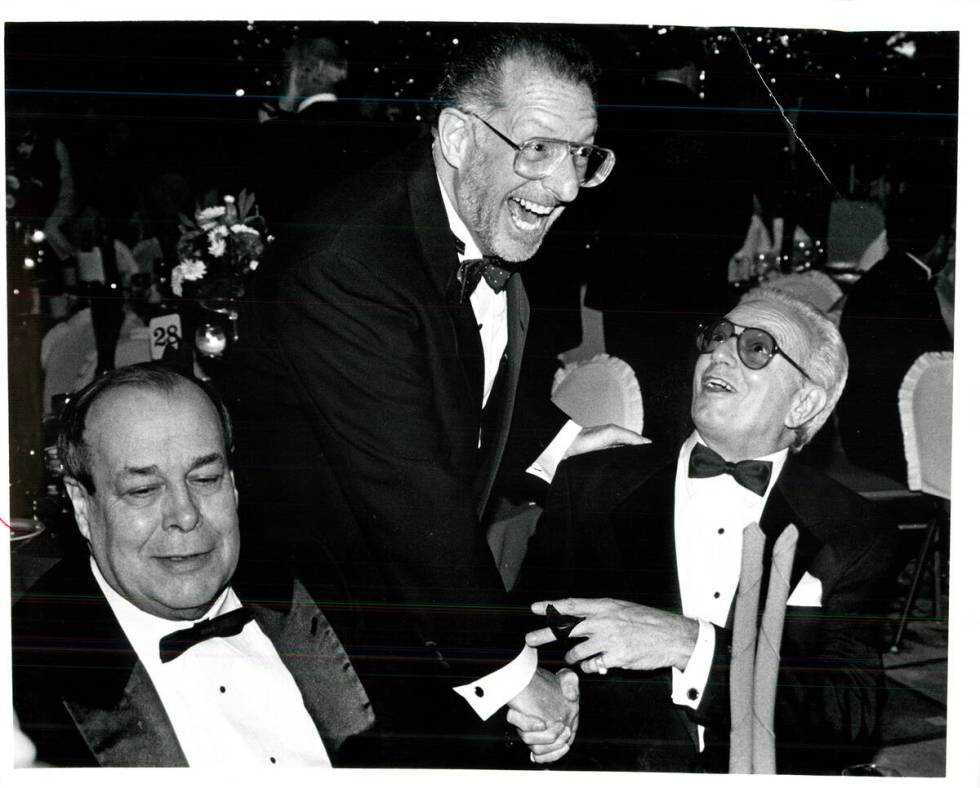
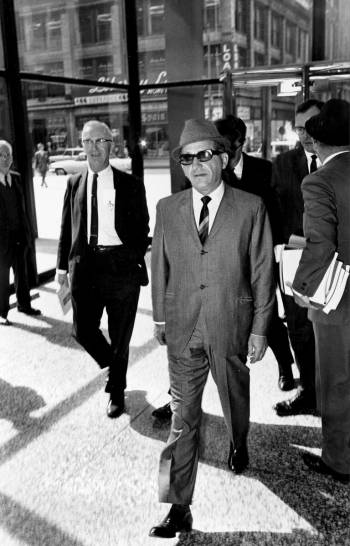
Over the decades, the types of criminals on the list changed. As mob-run casinos gave way to corporations, the focus on casino bans shifted from mobsters to cheaters.
Even today, it’s different. After a phase during which investigators were catching people using gadgets to steal from slot machines, thieves turned to distraction or smash-and-grab tactics. With much of the mob influence gone, the worst of the worst are now people who frequently try to steal from the casino or from other players.
Now with 37 inductees, the List of Excluded Persons includes some old-school mob associates, cheats, thieves and even a human trafficker who used casinos as a base of operations.
The one thing they have in common: All are believed to be damaging to the reputation of the casino industry.
The list remains one of the rarest instruments of regulation of private industry.
Since the book was created, 79 persons have been nominated for inclusion and selected. Once an individual’s name is on the list, it doesn’t come off until authorities verify the person has died. There are avenues available for removal from the list, but no appeal has been successful.
Sawyer’s influence
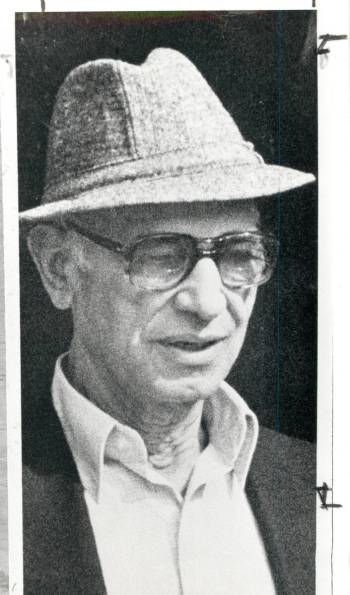
Gov. Grant Sawyer asked the Nevada Legislature to overhaul gaming regulations with the 1959 Nevada Gaming Control Act. Gambling had been legal in the state for 27 years at that point. Prior to the formation of the Gaming Control Board, gaming was monitored by the Nevada Tax Commission.
On June 13, 1960, the Gaming Commission put 11 people on the inaugural list because of their unsavory reputations — without due process.
Five years after the first listing, the next two people were added to the roster. And it wasn’t until 1972 that Regulation 28 — the guidelines for how the Black Book is administered — was first adopted by the Gaming Commission. Since initial adoption, the four-page regulation has been amended four times.
“The board may place on the list the name of any person who, by reason of any of the criteria set forth in NRS 463.151(3) is to be excluded or ejected from licensed gaming establishments that conduct pari-mutuel wagering or operate any race book, sports pool or games, other than slot machines only, whenever such exclusion or ejectment is in the best interests of the state of Nevada or of licensed gaming, after the same has been determined,” the regulation reads.
Nevada’s Black Book is now under the supervision of Chief Kristi Torgerson, who heads the Control Board’s Enforcement Division.
The law enforcement arm of the Control Board operates 24/7, conducting criminal and regulatory investigations, arbitrating disputes between patrons and licensees and making recommendations for the Black Book.
Last year, Torgerson took over as division chief from James Taylor, who retired from the board and now works as the director of corporate security and investigations for Las Vegas Sands Corp.
“I always think our history is important to maintain, our ties to our roots,” Torgerson said in a recent interview about how the List of Excluded Persons has evolved.
I always think our history is important to maintain, our ties to our roots
“The types of crimes are changing, and the types of threats to our casinos are changing. So I really look at this as another tool to administer regulation and try to safeguard our industry.”
Torgerson is the first to admit her style is different from that of Taylor, who enjoyed talking with and about the industry. He made public appearances at the Mob Museum, talking about the criminals and cheats the board has tried to keep out of casinos.
When he was chief of the division, Taylor would keep surveillance video files on his computer that showed how some of the more recent Black Book additions would try to take advantage of casinos or other players.
Worst of the worst
“We’ve always tried to keep the numbers of the list exclusive and manageable,” Taylor said. “Other jurisdictions have hundreds on their list, which is fine for them if they have a way to control that in their jurisdiction. But for us, with the wide-open casinos, the large casinos, it would be really hard to manage 300 or 400 people. So we’ve always kept it manageable. It’s really been a list of the worst of the worst, is the way I like to put it.”
It’s really been a list of the worst of the worst, is the way I like to put it.
New Jersey, for example, has an excluded persons list that includes 469 names.
The Gaming Control Board has a web page dedicated to its List of Excluded Persons, with short background summaries of every inductee.

Of the 37 currently on the list, Wilford Kalaauala Pulawa has been there the longest. He is believed to be 89 and was last known to have lived in Kapaa, Hawaii. He was inducted Jan. 23, 1975.

Sandra Vaccaro — the only woman on the list — has the second-longest tenure. She was inducted Oct. 2, 1986, is believed to be 85, and is last known to be living in Henderson.
The most recent addition was Neal Ahmad Hearne, 44, of North Las Vegas, inducted April 18, 2024.
Many of the inductees have colorful stories about what they did and how they were nominated, and Taylor knows just about all of them.
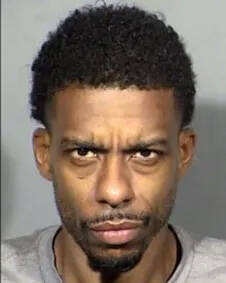
“The first ones that went in were organized crime types, but not just the Italian Mafia,” Taylor said. “There were a couple of Hawaiian organized crime people that went in before my time.

“I think the first cheat who went in was William Land, also a little before my time.”
Land, 89, of Las Vegas, is still on the list and was inducted Sept. 21, 1988.
“That was a weird case because it wasn’t unanimous and then, not too long after he was excluded, he was arrested again up in another jurisdiction for a major cheating case in Oregon or Washington at a tribal casino,” he said.
Land was added to the list after being caught multiple times marking cards.
Chip thieves
After busting casino cheats, a new threat emerged: chip thieves.
“You couldn’t categorize them as a cheat and you wouldn’t categorize them as a mob guy, but it was the new threat, and we don’t want the tourists to worry that they’re going to have their chips stolen,” Taylor said. “And we arrested this guy dozens and dozens of times. So the industry reached out to me and said, ‘Is there anything we can do with this guy?’ So I approached the board and said, ‘I really think that the book needs to change. It needs, like it morphed from mobsters to cheats, it needs to change again to what’s the current threat. And the current threat was all these people that are stealing chips, and not just one time but dozens of times, and the board all agreed, so we did.”
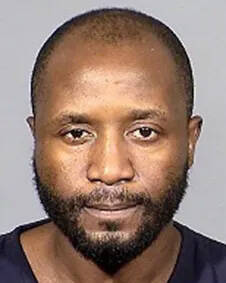
The first chip-thief inductee was Tasia McDonald Musa, 43, of Las Vegas, inducted Jan. 29, 2015. A similar case emerged involving Joseph Whit Moody, 54, of Henderson, who would steal cash from elderly tourists at casino ATMs.
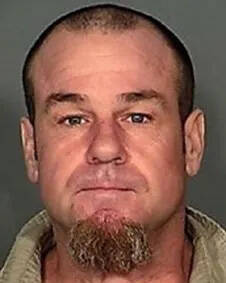
“He would steal their chips and steal their cash,” Taylor said of Moody. “There were over 100 instances of him stealing from elderly people. So we excluded him. It was basically a nuisance crime, but it was significant.”
Other chip thieves who have most recently been excluded were Hearne and Shaun Joseph Benward, 38, a Mississippi man who considers himself a magician and illusionist.

Benward had been arrested across the country, going from state to state and casino to casino with a style in which he struck up conversations to gain the trust of roulette dealers, then tried to place a bet late in the wheel’s spin. He often had an accomplice who would back up his story, and flustered dealers would allow the bet to be played. He was kicked out of 17 Nevada casinos and nominated for inclusion to the list by the Control Board in September 2023 after agents finally got wise to what he was doing.
Hearne was more of a smash-and-grab type of thief.
Surveillance video would show him approaching a table game, scooping up a handful of chips, then dashing for the nearest exit. Eventually, he was caught cashing chips, and when he was no longer incarcerated, was nominated for the book.
Book critics
Not everybody has a high opinion of Nevada’s Black Book.
Former defense attorney Oscar Goodman, who represented clients associated with the mob and served as Las Vegas mayor from 1999 to 2011, believes regulators have gone overboard in their rush to ban people from the state’s casinos.
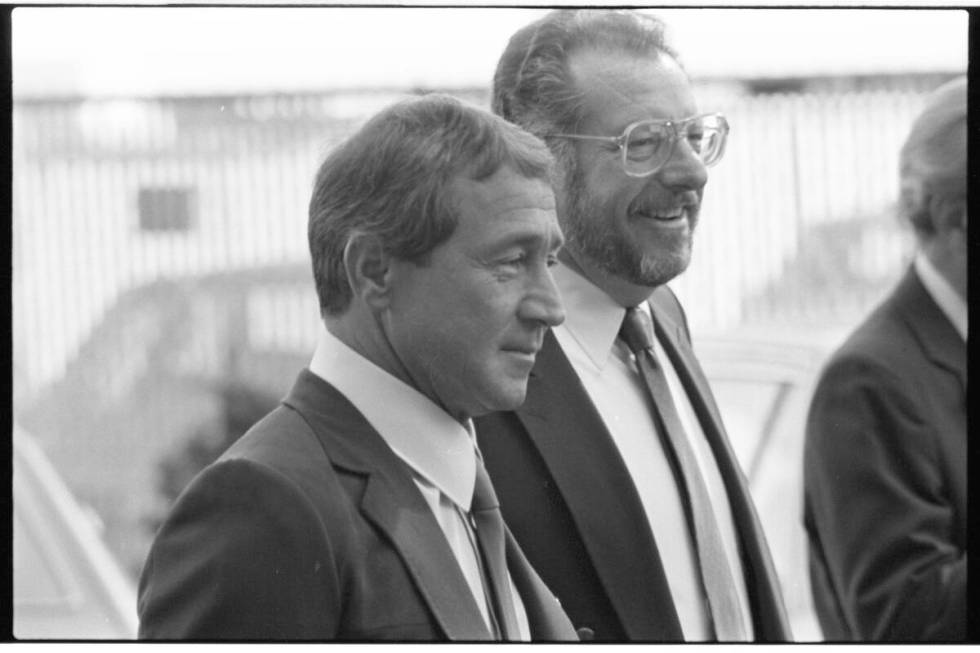
He objects to people being singled out for their past associations with alleged mobsters and the process of banning casino patrons who’ve never been convicted of any type of gaming crime.
He cites a book written by former UNLV professors Ronald Farrell and Carole Case, published by University of Wisconsin Press in 1995, titled “The Black Book and the Mob: The Untold Story of the Control of Nevada’s Casinos.”
The book chronicles the history of the Black Book — with criticism of its flaws.
“It’s an abomination of the law,” said Farrell, the former dean of social sciences and a sociology professor at City College of New York. “The evidence used is hearsay from snitches and informants. It’s a kangaroo court.”
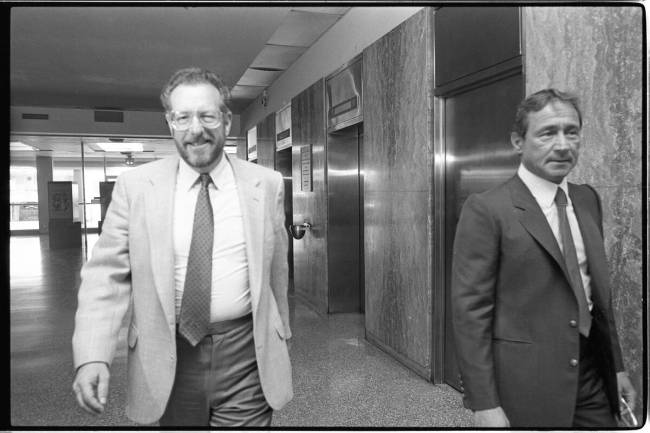
Goodman’s biggest criticism is that the state enabled a process to ban people from casinos based on reputation and not court records. He’s convinced some were banned simply because of associations and because they were of Italian American heritage.
Among those he feels have been wrongly placed in the book: Joseph Cusumano, a Las Vegan inducted June 21, 1990. Cusumano has been accused of being an associate of mob enforcer Tony Spilotro.
In a 2012 interview with the Las Vegas Review-Journal, Cusumano said he no longer cares that he can’t enter a casino, even though he can’t patronize the restaurant of his friend Goodman at the Plaza.
“Joey Cusumano was a very important one to me,” Goodman said, “because here’s a fellow who attended the opening of The Smith Center, listening to violin virtuosos, and everybody would stop by and say, ‘Hi Joey,’ to him, all the doctors and lawyers, and he regularly plays tennis at the Las Vegas Country Club. He’s very accepted in the community.”
Today, Cusumano enjoys his anonymity.
But like 36 others, he still can’t set foot inside a Nevada casino.
Contact Richard N. Velotta at rvelotta@reviewjournal.com or 702-477-3893. Follow @RickVelotta on X.



